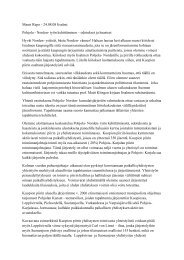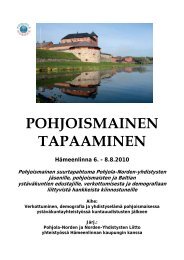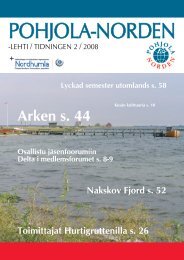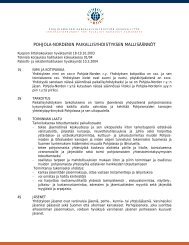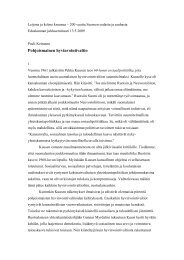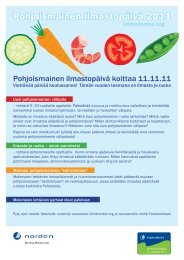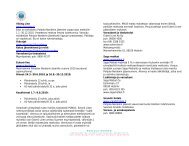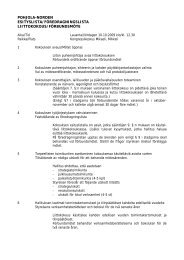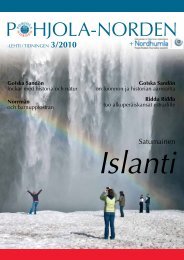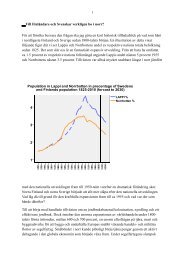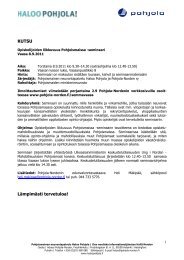The Nordic Model - Embracing globalization and sharing risks
The Nordic Model - Embracing globalization and sharing risks
The Nordic Model - Embracing globalization and sharing risks
You also want an ePaper? Increase the reach of your titles
YUMPU automatically turns print PDFs into web optimized ePapers that Google loves.
One may ask why this problem arises. If we all underst<strong>and</strong> that<br />
taxes are needed to finance the welfare state we support, why is<br />
there a problem? <strong>The</strong> reason is that individual tax payments have<br />
no direct effect on the services the tax payer can access. This is<br />
precisely one of the defining characteristics of the <strong>Nordic</strong> model,<br />
namely that entitlements are unrelated to tax payment. Another<br />
way of expressing this is that the effect of one individual contributing<br />
a little more or less in taxes is negligible as it is shared with 5<br />
million other inhabitants. However, when the whole population<br />
contributes less it adds up <strong>and</strong> has significant implications for<br />
total finances.<br />
<strong>The</strong> effect of taxes on distortions therefore implies that it is<br />
not costless to levy taxes. <strong>The</strong> cost of raising one euro of public<br />
revenue is effectively larger than one euro. This is so since the cost<br />
includes both the direct effect of the euro going to the public sector,<br />
<strong>and</strong> the cost in terms of the economic activity squeezed out due to<br />
the tax. If a tax of one euro reduces incomes by, say, 20 cent, then<br />
the true cost of raising one euro to the public sector is euro 1.20;<br />
namely, the one euro paid directly <strong>and</strong> the indirect income loss<br />
of 20 cent. Available estimates are highly uncertain but suggest<br />
that the (marginal) cost of public funds for Finl<strong>and</strong> <strong>and</strong> the other<br />
<strong>Nordic</strong> countries may indeed be much higher than the direct costs<br />
because of the increase in efficiency losses. 5<br />
A problematic aspect of taxation is that it makes the price<br />
of leisure lower to individuals than it is to society. An individual<br />
considering the option of enjoying more leisure (shorter working<br />
hours, more vacation, earlier retirement) will lose the net income<br />
after all taxes, or the consumption that the net wage would buy.<br />
To society the cost of leisure is the total income lost, including<br />
the tax revenue of the public sector. Hence, the tax wedge causes<br />
a difference between the cost of leisure to the individual <strong>and</strong> to<br />
society; leisure is less costly to the individual deciding on his or<br />
her leisure than it is to the society at large.<br />
<strong>The</strong> above may seem to leave a puzzle for underst<strong>and</strong>ing the<br />
<strong>Nordic</strong> countries: if taxes are potentially so harmful, how come<br />
overall labour force participation is high, <strong>and</strong> how can these<br />
countries be among the richest countries in the world? <strong>The</strong>re are<br />
many explanations for this (<strong>and</strong> yet the issue may not be fully<br />
understood).<br />
<strong>The</strong>re is a “common<br />
pool” problem in that<br />
the individual does<br />
not factor in the consequences<br />
of his/her<br />
decision for the society<br />
at large<br />
<strong>The</strong> costs to the economy<br />
of collecting 1<br />
euro in taxes is significantly<br />
larger than<br />
1 euro<br />
Taxes on labour makes<br />
leisure unduly attractive<br />
relative to work<br />
How can the <strong>Nordic</strong><br />
economies do reasonably<br />
well at these tax<br />
rates?<br />
96 · <strong>The</strong> <strong>Nordic</strong> <strong>Model</strong>





